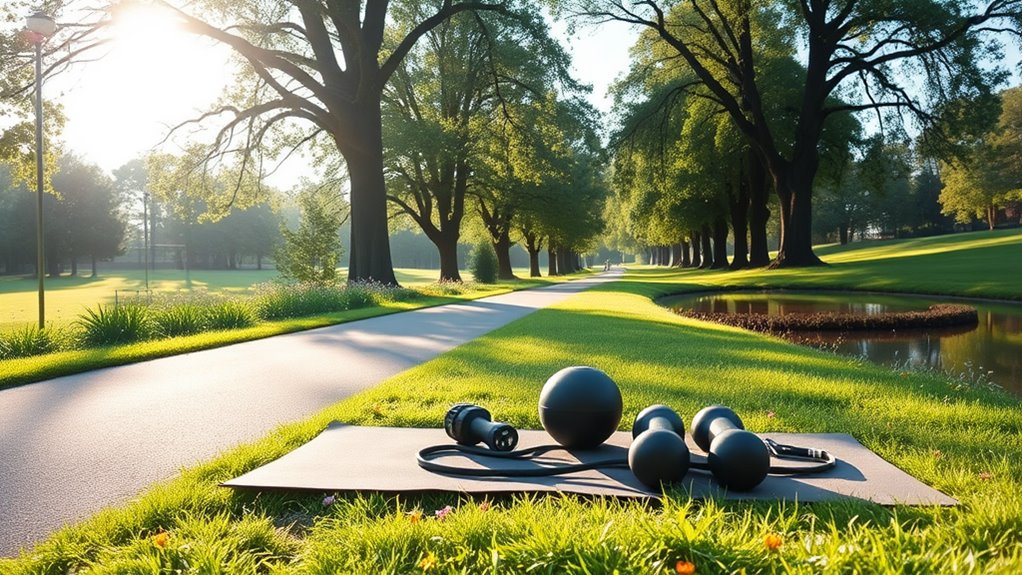
To enhance your sleep quality, incorporate regular exercise into your routine. Physical activity helps you achieve deeper sleep stages, reducing insomnia and increasing sleep efficiency. By stabilizing your circadian rhythm, exercise regulates your sleep-wake cycle and lowers stress hormones, promoting relaxation. Morning workouts, aligned with natural light, further improve sleep by syncing internal clocks. Aerobic exercises like walking and running, alongside strength training and yoga, are particularly beneficial. Aim for at least 150 minutes of moderate activity weekly. Remember, boosting your exercise regime can help mitigate sleep disturbances and elevate your overall mood. There’s plenty more to uncover.
Stress Reduction Through Exercise
Stress, an inevitable part of life, can be effectively managed through regular physical activity. Embracing exercises like brisk walking, jogging, or cycling liberates you from the grips of stress by utilizing both mindful movement and aerobic strength. These activities don’t just engage the body; they invigorate the mind, allowing you to escape the weight of daily anxieties. Engaging in outdoor activities such as hiking or paddleboarding not only boosts physical health but also reduces stress through exposure to nature. Each burst of movement reduces stress hormones like cortisol and adrenaline, replacing them with mood-boosting endorphins, leaving you with a profound sense of well-being and clarity.
By prioritizing 30 minutes of moderate-intensity exercise most days, you’re crafting an armor against stress’s relentless presence. If full intensity isn’t for you, incorporating gentler routines such as yoga or tai chi creates a powerful harmony between physical movement and mindful presence. Incorporating mindfulness practices into your exercise routine can enhance mental clarity and emotional stability, making your stress management more effective. These practices gently guide you into a state of relaxation, easing your tension and fostering deep tranquility. You deserve to feel unchained and free, and exercise offers that escape.
Regulating Your Circadian Rhythm
Exercise plays an essential role in regulating your circadian rhythm, greatly impacting your sleep-wake cycle. By engaging in regular physical activity, you’re not just improving your physical health but also achieving circadian alignment, which is crucial for your overall well-being. Regular exercise also promotes better sleep patterns, helping reduce insomnia symptoms and maintain a consistent sleep schedule. Morning exercises, in particular, help synchronize your body’s internal clock with natural light-dark cycles, so you’re more in tune with day and night shifts. This alignment impacts your hormonal balance, influencing the critical sleep-regulating hormones, cortisol, and melatonin, leading to enhanced sleep quality. Recent studies have shown that long-term morning exercise is linked to decreased cortisol levels and improved sleep quality.
Benefits of Outdoor Workouts

While aligning your circadian rhythm is essential for good sleep, incorporating outdoor workouts into your routine can elevate sleep quality even more. Embracing the freedom of nature immersion and workout variety, you naturally improve your sleep patterns. Fancy some cycling, jogging, or yoga under the open sky? You’ll get more than a workout—you’ll enhance your physical and mental well-being too. Engaging in outdoor exercise releases endorphins, serotonin, and dopamine, promoting a sense of relaxation and aiding in better sleep quality. Regular exercise not only boosts physical health but can also enhance emotional resilience, helping you manage everyday stress more effectively.
Here’s why you should engage in outdoor exercises for better sleep:
| Benefit | Physical Effect | Psychological Effect |
|---|---|---|
| Improve Deep Sleep | Boosts slow wave sleep | Reduces anxiety |
| Decrease Stress | Lowers cortisol levels | Staves off depression |
| Increase Melatonin | Boost from natural sunlight | Regulates mood |
| Reduce Sleep Disorders | Lowers apnea and insomnia risk | Enhances cognitive function |
| Enhance Mood | Releases endorphins, serotonin | Lowers blood pressure |
Venturing outside connects you to uplifting sunlight and clean air, elements urban life often lacks. By reducing stress and immersing yourself in nature, you’re more likely to reduce anxiety, regulate mood swings, and walk the path toward revitalized sleep. Embrace the liberation of outdoor workouts and relish the benefits they bring to your nightly rest.
Boosting Sleep Quality and Duration
As you explore ways to boost sleep quality and duration, consider incorporating regular exercise into your daily routine. Embracing physical activity is a powerful way to enhance your sleep hygiene. Exercise reduces stress and anxiety by lowering cortisol levels, paving the way for improved sleep initiation. Regular exercise schedules support stable circadian rhythms, promoting sleep and ensuring you wake up feeling refreshed. Adding physical activity to your routine can lead to improved lung capacity, which positively impacts your overall health and aids in better sleep.
Remember, timing is key. Exercising 1 to 2 hours before bedtime allows your body to cool down, signaling that it’s time to wind down and begin your relaxation techniques. Engaging in moderate to vigorous physical activity boosts the amount of deep sleep, enhancing overall sleep quality. This crucial stage of rest repairs and rejuvenates your body, leaving you revitalized.
Plus, incorporating activities like yoga or light stretching fosters relaxation, helping to usher your mind into a calm state before bed. Exercise supports the circadian rhythm, stabilizing your sleep-wake cycle. Committing to at least 30 minutes of physical activity each day guarantees enduring benefits.
You’ll notice that sleep and exercise create a positive feedback loop, reinforcing each other harmoniously. Embrace this liberating routine, and watch as regular exercise transforms your nights into restful, rejuvenating experiences. Your body and spirit will thank you.
Alleviating Daytime Sleepiness

Feeling sluggish during the day and need a boost? You can reclaim your energy with regular exercise, a powerful strategy for energy management and maintaining ideal sleep hygiene. Just 30 minutes of moderate to vigorous activity daily can drastically reduce daytime sleepiness and elevate your sleep quality.
Embrace a variety of exercises, from aerobic and strength training to balance and flexibility routines, over 12 weeks, and witness the release from persistent daytime fatigue. Evening workouts can be your ally, with exercises like yoga and light stretching enhancing relaxation without compromising sleep. This balance is crucial for nurturing your energy reserves and ensuring you’re ready to conquer each day.
Physical activity doesn’t just diminish hypersomnia; it also regulates your body’s internal clock, fostering a natural harmony between rest and energy. In addition, brisk walking positively impacts muscles and bones, which further supports overall wellness and vitality.
Integrate exercise consistently; morning or during work breaks can boost not just your mood, but also your nighttime restfulness, ensuring your days are vibrant and fulfilling. Keep a diary to discover the ideal exercise times, unlocking the full potential of your sleep and daytime alertness. With these practices, you’re not just managing energy but reclaiming your empowered, uninhibited self.
Managing Common Sleep Disorders
Regular exercise greatly boosts daytime alertness and overall sleep quality, yet its benefits mightn’t fully address those struggling with sleep disorders. If you’re among the 50 to 70 million individuals battling sleep conditions like sleep apnea or chronic insomnia, simply working out won’t cut it.
Managing insomnia involves recognizing what disrupts your rest. Women, older adults, or those under stress are particularly prone, with insomnia’s health consequences looming large. Empower yourself with insomnia management techniques to reclaim nights of restful sleep.
Sleep apnea is another common struggle. Shockingly, the majority of cases remain undiagnosed. With untreated sleep apnea posing risks like heart disease, it’s essential to actively seek screening. Recognize risk factors like weight gain and take steps toward intervention.
These sleep disorders impact every facet of life, from health to daily functionality, yet liberation is possible.
Consider these thoughts:
- Feeling trapped in endless nights of poor sleep? Seek help and break free!
- Dream of vibrant mornings? Address sleep apnea or insomnia and make it reality!
- Need restful nights for energetic days? Proactive steps can transform your life!
Confronting these disorders isn’t easy, but with the right approach, freedom from restless nights is within reach.
Enhancing Energy Levels Naturally

Boosting your energy levels naturally can transform not only your days but your overall well-being. Releasing that energy begins with nutritional balance. Consuming foods rich in magnesium fuels over 300 biochemical reactions in your body, turning glucose into energy.
Choose whole foods—unprocessed, fresh, and brimming with essential nutrients. Incorporate essential fatty acids from lean meats, fish, and nuts. These healthy fats don’t just support muscle growth; they power up ATP production, your body’s energy currency.
Don’t overlook hydration strategies in your quest for freedom from fatigue. Even mild dehydration can leave you feeling drained. Embrace a habit of drinking enough water throughout the day. It’s a simple, effective way to preserve and amplify your energy reserves.
Combine these strategies with regular physical activity. Exercise, above anything else, elevates your energy by stimulating ATP production and building muscle mass.
Begin with small steps, like brief walks, and gradually work up to a more consistent routine. Remember, consistency is your ally, and every bit helps in sustaining energizing momentum.
Embrace this holistic approach, and you’ll soon feel your zest for life rekindled, ready to seize each day with renewed vigor.
Effective Timing for Exercise
While enriching your energy levels naturally sets the stage for a vibrant day, understanding the timing of your exercise can further enhance your sleep quality. You might wonder about the ideal moment to fit that invigorating workout into your day. The answer? It’s all about aligning with your body’s natural rhythms and personal preferences.
Morning workouts can provide a burst of energy and help early birds fall asleep quicker, thanks to their alignment with your circadian rhythm. However, evening exercise could benefit night owls by syncing with their natural energy peaks.
Feel empowered by trusting your instincts:
- Freedom to Choose: Experiment with different times to find what resonates with your body.
- Evening Zen: Moderate evening workouts can promote restful sleep, as they encourage relaxation.
- Vigilant Timing: Avoid vigorous exercise in the hour before bed to prevent sleeplessness.
Exercise isn’t just about consistency; it’s about tuning into what your body craves. Late afternoon sessions are ideal for many, but it’s essential to listen to your own exercise preferences.
Just remember, avoiding intensive workouts right before sleep can help your body unwind and embrace relaxation naturally.
Tips to Start Exercising

Starting on a fitness journey can be intimidating, yet creating a solid plan can ease your way into exercise. Begin slowly by gradually increasing the duration and intensity of your workouts. Setting realistic goals, like walking 30 minutes daily, can help you stay motivated. Nothing screams freedom like overcoming fitness challenges and sharing triumphs with accountability partners.
| Step | Action | Outcome |
|---|---|---|
| Start Slowly | Gradually increase activity | Avoid burnout |
| Set Realistic Goals | Aim for achievable targets | Feel accomplished |
| Incorporate Variety | Mix activities | Prevent boredom |
| Track Progress | Keep a logbook | Celebrate milestones |
| Schedule Regularly | Exercise same time daily | Form a lasting habit |
For a more enjoyable experience, choose activities you love. Wear proper gear to stay comfortable, listen to your body, and remain hydrated throughout your sessions. To prevent injuries, don’t skip warming up and cooling down—these are essential parts of your new routine!
Incorporate Activity in Daily Routine
Incorporating physical activity into your daily routine isn’t just about boosting fitness levels; it’s about enhancing your overall quality of life, including improving sleep. Engaging in regular exercise doesn’t have to be a bore. Finding your exercise motivation comes from embracing a workout variety that caters to your interests and needs.
Whether it’s a brisk morning jog, a calming session of yoga, or energizing strength training, finding what speaks to you is essential. You’ll not only enjoy peace of mind and improved mood but will also experience deeper, rejuvenating sleep.
When you integrate activity naturally into your routine, the benefits ripple through your life, offering:
- Increased energy and liveliness: Wave goodbye to daytime sleepiness and hello to a more vibrant day.
- Greater serenity: Allow nighttime calm to envelop you, leading to restful, fulfilling sleep.
- A more joyful existence: Lift your spirits and lighten your load with endorphin-filled exercise joy.
Consistency is key, so aim for at least 30 minutes of moderate aerobic exercise daily. Embrace the freedom that a flexible routine allows.
Variety not only keeps things interesting but also profoundly impacts your sleep quality. Feel empowered as physical activity becomes a natural, enjoyable part of your life.
Effective Sleep, Daily Exercise

Regular exercise is a powerful tool for enhancing sleep quality. Different types of physical activities, from moderate aerobic exercises to high-intensity workouts, each contribute uniquely to improved sleep. Importantly, the timing and consistency of exercise play pivotal roles in maximizing sleep benefits.
By incorporating a variety of activities like cardio, strength training, and flexibility exercises into daily routines, individuals can enhance sleep duration and quality, reduce insomnia symptoms, and promote overall well-being. The physiological effects of exercise, such as increased melatonin production and regulation of cortisol levels, further underline its role in facilitating restful sleep.
Creating a personalized and balanced exercise routine is vital to reaping these sleep-enhancing benefits. Moderate aerobic activities like brisk walking or swimming, performed consistently for 30 to 60 minutes, can lead to immediate improvements in sleep quality, reducing sleep onset latency and increasing deep sleep periods.
While high-intensity workouts may have varying effects depending on individual preferences and timing, incorporating these exercises within a routine can complement the benefits of moderate exercises. Exercising in the morning or late afternoon is often beneficial for those with insomnia, as it can establish a regular sleep rhythm.
Additionally, individuals should pay attention to their body’s responses to exercise, finding the best time and intensity that promotes sleep without causing interference. This personalized approach guarantees that even small amounts of routine exercise contribute to better sleep and enhance overall health.
Through regular physical activity, individuals can also experience a decrease in daytime sleepiness, creating a positive feedback loop for continued engagement in healthy exercise practices.














